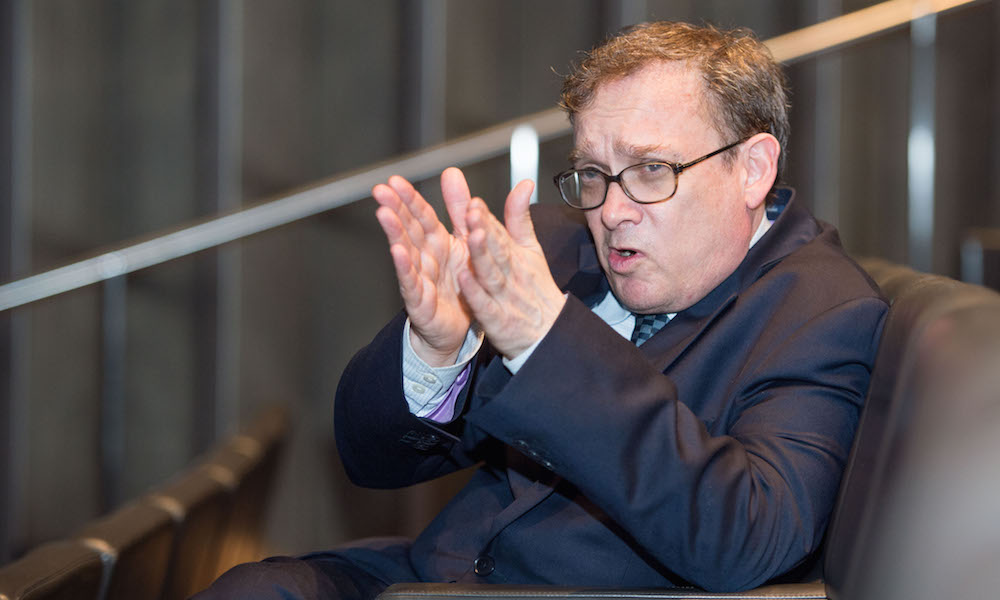
Adrian Wooldridge is The Economist’s management editor and writes the “Schumpeter” column. He was previously based in Washington, D.C., as the Washington bureau chief and author of the “Lexington” column. Among his books are The Right Nation, a study of conservatism in America, co-authored with John Micklethwait, and Masters of Management: How the Business Gurus and Their Ideas Have Changed the World—for Better and for Worse. Before participating in a Zócalo/Smithsonian “What It Means to Be American” panel in London on whether America is still a British colony, Wooldridge visited the green room to discuss CEO pay, chocolate bars, and why it matters that America is a big country.
What do you miss most about Washington, D.C.?
I think it was the sense in Washington that you were right at the center of the world, where really monumental decisions were being made. And there was a sort of adrenaline rush about being a witness to those and an illusion you have in journalism that you’re not just a witness but a part of it.
When I was there in Washington, there was a succession of really monumental decisions. One was who gets to be president after the 2000 election. Then, how to respond to September 11 and whether to invade Iraq. I felt an enormous sense of excitement about being an observer of that and the debates about weapons of mass destruction and the war.
What is the last habit you tried to kick?
The last habit I tried to kick was eating a lot of chocolate bars. I lost 10 pounds in two weeks from stopping. But chocolate is minor evil. I haven’t smoked a cigarette in about two years.
Do you have favorite kind of sandwich?
You go to a place called Potbelly and there’s a thing with a lot of salami? The Wreck, that’s it! I only ate sandwiches in the U.S. Sandwiches are not that good here [in England]. America is the best sandwich-producing country. The worst country for sandwiches is Japan.
What American economic idea do you think has been most influential in the U.K. or around the world?
It’s the idea that the function of the corporation is to boost shareholder value, and that’s exclusively what it’s for. That was an idea articulated in the most sort of comprehensive form by Michael Jensen, who argued you should link payments of CEOs to shareholder value. One thing to do is to give them shares so they’re acting like owners. It’s had a significant effect on the way CEOs are remunerated. In the ’70s, the average ratio of CEO-to-employee pay was 1 to 30. Now it’s 1 to 300.
What do you do to decompress?
Sometimes I watch the television, but I watch television in a new way. Whereas the old way was to watch a program and wait for number two, now I can watch the whole lot. It’s relaxing to watch a whole series. The other thing is take the dog for a walk—I live in the countryside and I like to listen to books when I walk.
Which show are you binge-watching?
I enjoy this Scandinavian one—The Killing. It’s a Danish thing. And then there was your thing from Los Angeles, Breaking Bad. That was very good. I know it’s very unfashionable to watch television and it’s frowned upon by the intelligentsia, but we’re living in a golden age of TV.
As a kid, what did you want to be when you grew up?
I think an historian. I was very interested in history as child. I liked the history of violence and wars, Vikings, crusaders, medieval and pre-medieval battles. I was really keen on studying Vikings and crusaders.
How would you describe yourself in five words or less?
Irritable. Lazy. Self-obsessed. Focused.
As an outside observer, what do you think it means to be American?
It’s such a difficult question. I lived in America for a long time and spent time thinking about America. I came to the conclusion after all this that America is a big country. And that shapes everything. In Europe, we live on a small continent where you can’t even swing a cat easily. In America, you can reinvent yourself and destroy things and always have another opportunity. In Europe and Japan, you live in a small, fragile world. That’s my geographical determinism.



